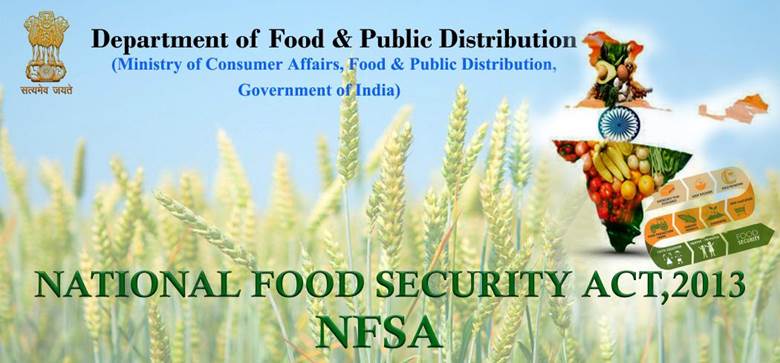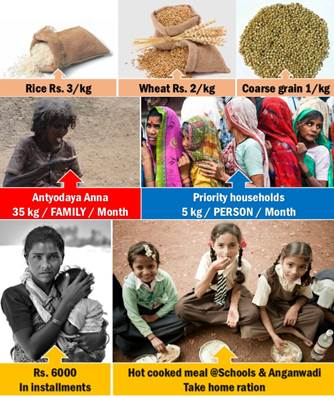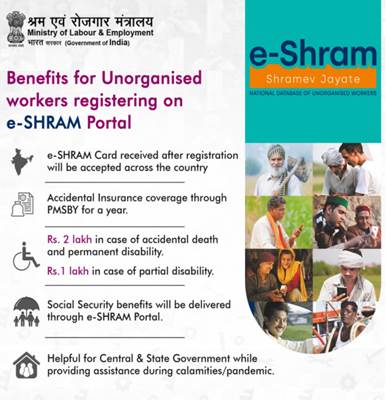Description

Copyright infringement not intended
In News
- The Supreme Court of India has directed the Union government to expand the coverage under the National Food Security Act (NFSA).
- The main objective of the verdict was to provide benefits to needy persons and citizens under the provisions of the National Food Security Act (NFSA).
- The Supreme court also directed the States to register unorganized workers, including migrant labourers, on the e-Shram portal within 6 weeks.

Food Security
- The basic concept of food security is to ensure that all people, at all times, should get access to basic food.
- The right to food is part of the fundamental right to life enshrined under Article 21 of the Indian Constitution.
- The government enacted the National Food Security Act, of 2013 to shift the approach from welfare to a rights-based approach.
- National Food Security Act, 2013
- The National Food Security Act, 2013 was notified to provide food and nutritional security.
- The objective of the Act is to provide for food and nutritional security in the human life cycle approach, by ensuring access to an adequate quantity of quality food at affordable prices to people to live a life with dignity.
- The Act provides for coverage of up to 75% of the rural population and up to 50% of the urban population for receiving subsidized foodgrains under the Targeted Public Distribution System (TPDS), thus covering about two-thirds of the population.
- The eligible persons will be entitled to receive 5 Kgs of foodgrains per person per month at subsidized prices of Rs. 3/2/1 per Kg for rice/wheat/coarse grains.
- The existing Antyodaya Anna Yojana (AAY) households, which constitute the poorest of the poor, will continue to receive 35 Kgs of foodgrains per household per month.
- Corresponding to the all-India coverage of 75% and 50% in the rural and urban areas, State-wise coverage is determined by the Central Government.
- The work of identification of eligible households is to be done by States/UTs.
- Pregnant women and lactating mothers and children in the age group of 6 months to 14 years are entitled to meals as per prescribed nutritional norms under Integrated Child Development Services (ICDS) and Mid-Day Meal (MDM) schemes.
- Children up to 14 years of age are entitled to nutritious meals as per the prescribed nutritional standards. In case of non-supply of entitled food grains or meals, the beneficiaries will receive a food security allowance.
- Besides meals to pregnant women and lactating mothers during pregnancy and six months after childbirth, such women are entitled to receive maternity benefits of not less than Rs. 6,000.
- The eldest woman of the household age 18 years or above be the head of the household to issue ration cards.
- Grievance redressal mechanism at the District and State levels. States will have the flexibility to use the existing machinery or set up separate mechanisms.

Copyright infringement not intended
E-Shram Portal
- The Ministry of Labour and Employment has developed the e-SHRAM portal for building a National Database of Unorganized Workers (NDUW).
- The Portal was developed with the aim of extending the benefits of the social security schemes to unorganized sector workers.
- It is the first-ever national database of unorganized workers including migrant workers, construction workers, gig and platform workers, etc.
- The following is required to register on the portal:
- Aadhar Number
- The mobile number is linked with Aadhaar
- Savings Bank Account Number
- It created a centralized database of all unorganized workers including Construction Workers, Migrant Workers, Gig and Platform workers, Street Vendors, Domestic Workers, Agriculture Workers, etc.
- Smooth Sharing of information in respect of registered unorganized workers with various stakeholders such as Ministries/ Departments/ Boards/ Agencies/ Organizations of the Central & State Governments.

Copyright infringement not intended
https://epaper.thehindu.com/Home/ShareArticle?OrgId=G3UA6JLSA.1&imageview=0
https://t.me/+hJqMV1O0se03Njk9

















